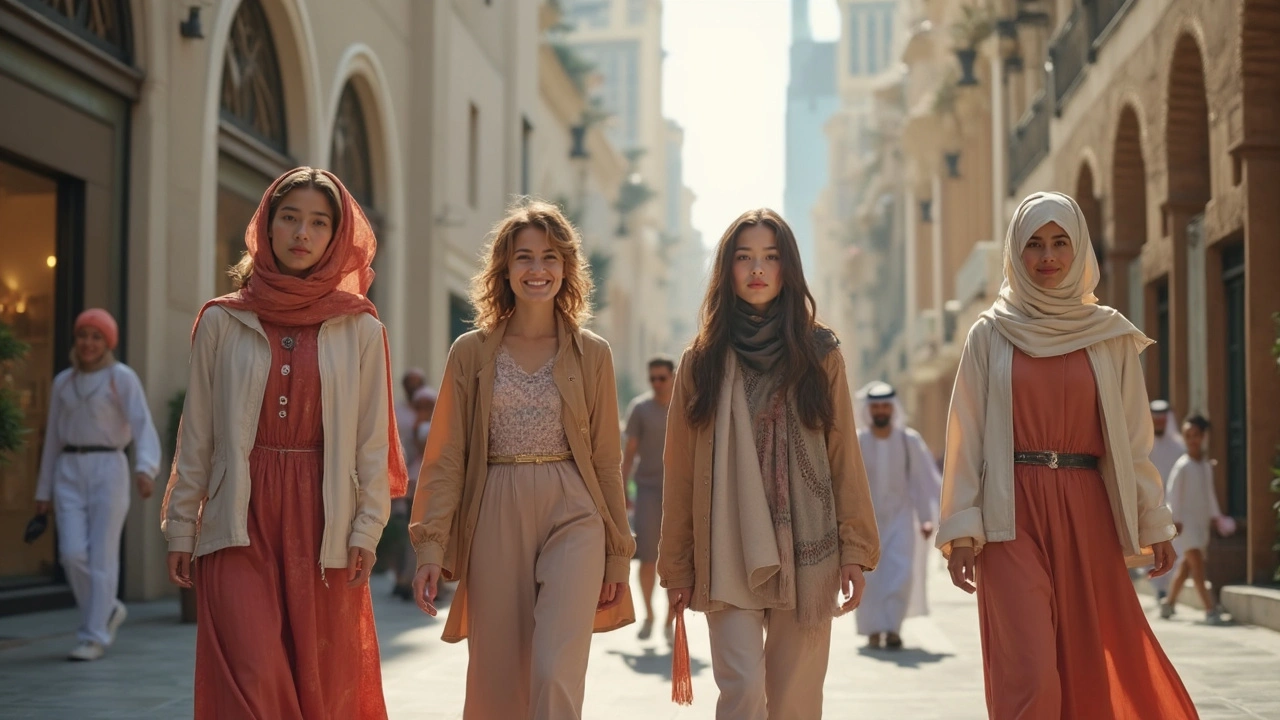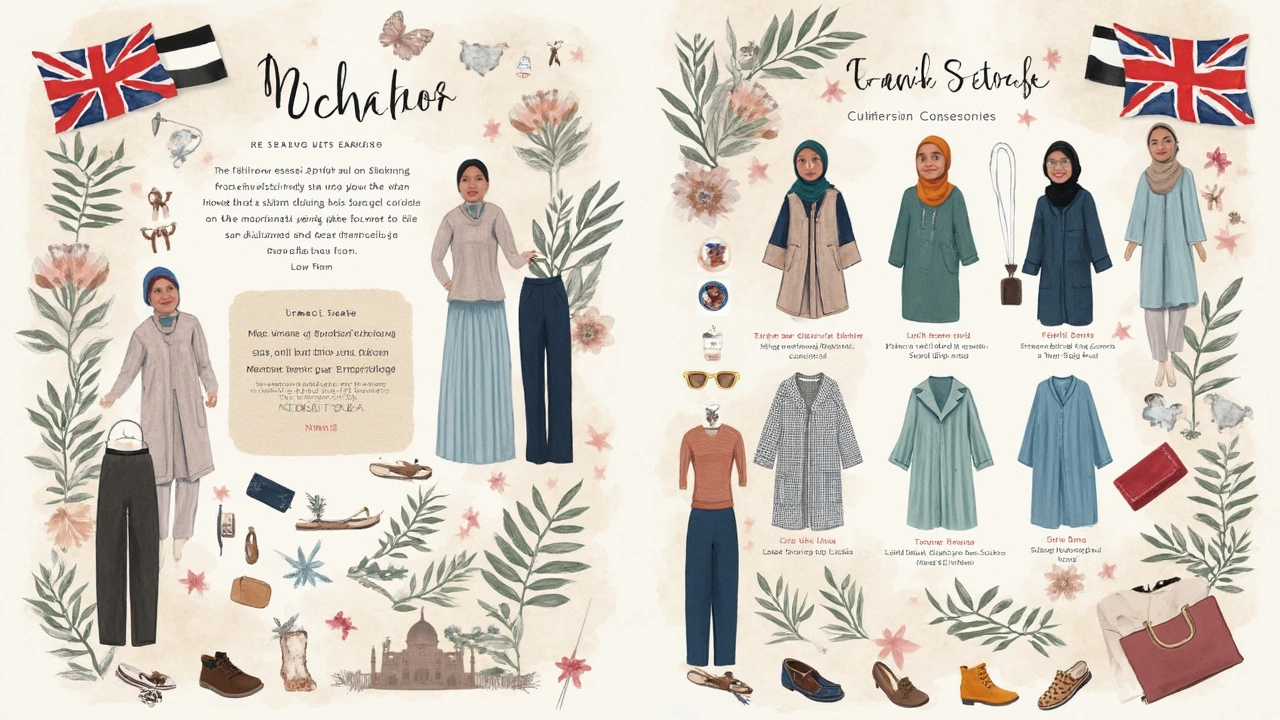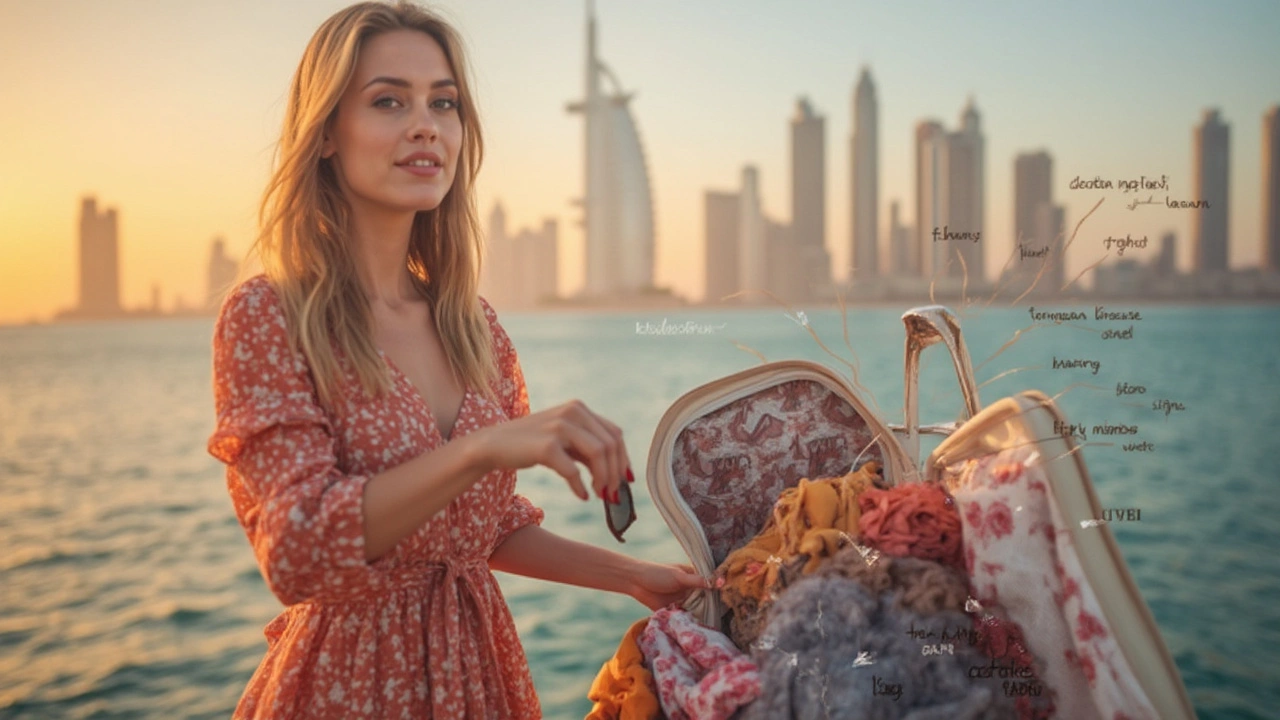Step off the plane in Dubai and you’ll see world-class shopping, jaw-dropping towers, and women in designer labels—some swishing down hotel lobbies in sleeveless dresses, others sweeping past in elegant abayas. So, what’s the deal? Can girls actually show skin in Dubai, or is that just social media fantasy?
Dubai’s Dress Code: What the Law Actually Says
The most common myth? That you’ll be fined or arrested for wearing a tank top. Dubai doesn’t have clothing police walking the malls, but there are official rules and a few grey areas. Dubai’s dress code isn’t as strict as neighboring Saudi Arabia, but it does ask everyone—men and women—to dress modestly, respecting “local customs and values.” That phrase shows up everywhere from government websites to mall signs.
So, what’s “modest” mean? Technically, shoulders and knees should be covered in public spaces. Cleavage, midriffs, or see-through fabrics are a solid no. But here’s where it gets confusing: what’s totally normal in a luxury hotel might cause stares or even a polite warning in a local market. There’s no actual written law detailing every must and must-not, but the government leaves it up to businesses and public venues to enforce their own rules.
According to the Dubai Tourism Authority, ‘modest’ means clothing that covers your shoulders and knees, and doesn’t offend. That’s shorts at least knee-length and tops that aren’t too low or strappy. A 2024 travel survey by Emirates Holidays found 70% of female first-time visitors were confused about the dress code and what ‘modest’ really means. It’s not only expats wondering: a local Emirati consultant interviewed in June 2024 said most young Emiratis dress modestly out of respect for elders, but the city’s global flair makes it easy to blend styles.
| Location | Dress Code Requirement |
|---|---|
| Shopping malls | Shoulders and knees covered |
| Hotels | Relaxed (swimwear allowed at pools) |
| Public beaches | Swimwear permitted |
| Restaurants | Smart-casual, modest |
| Mosques | Hair, arms, legs fully covered |
There’s never a police officer with a ruler, but security staff have politely handed out shawls at Dubai Mall to tourists in spaghetti straps. Sometimes, a shopping center will stick up a sign: “Dress modestly, cover shoulders and knees.” The rules are stricter if you’re somewhere official or religious—government offices, courts, or mosques are absolute no-skin zones.
Real Stories: Girls Navigating Dubai’s Fashion Scene
Think the rules only apply to big traditional families? Every girl traveling or living in Dubai has her own dress code story. One British influencer posting from Jumeirah Beach in April 2024 explained she wore a bikini at the resort’s private pool, but wrapped up in a long kaftan before heading through the lobby, because she’d seen staff ask women to cover up before. My friend’s daughter got nudged by a security guard for shorts that just didn’t reach her knees at Dubai Mall. Upset, she later found out it’s a frequent gentle reminder, not a ticketable offense.
Dubai’s nightclubs and bars are a different world. Inside, you’ll see as much skin as you might at a Sydney club—backless dresses, minis, off-the-shoulder tops. Bouncers check for ID, not hemlines. But clubbing outfits stop at the taxi: plenty of girls travel in jeans and a tee, changing at the venue or covering up with an extra layer for the trip.
What about beaches? You can totally wear bikinis, one-pieces, or tankinis at nearly every hotel pool or beach club. Things change on the public sands at Jumeirah Open Beach or Kite Beach. Officially, swimwear is fine on the beach itself, but once you’re off the sand, grab a sundress or sarong. Local police sometimes walk the boardwalk and have been known to ask for more clothing away from the waterline.
Even with all these details, you’ll still spot plenty of influencers in backless tops around JBR (Jumeirah Beach Residences) or Marina Walk. Most slip on a light cardigan and jeans to get there. That said, getting snapped by a security guard—especially in a “no camera” area of a mall—can draw more attention than your outfit, so be careful about both.
Why the mix of rules and casual exceptions? Partly, Dubai’s packed with expats and tourists, so its officials have to keep peace without alienating visitors. Crowd-watching in a mall, you’ll see local women in traditional abayas beside tourists in jeans, and you’ll almost never see a public argument about clothing. Everyone understands there’s a cultural line, and going over it just isn’t worth the awkward moment.

How Do Locals and Expats Dress?
If you want to fit in, take your style cues from Dubai’s army of global residents. Emirati women often wear black abayas and shaylas (headscarves), but what’s under the abaya could be Chanel, Zara, or even ripped jeans. Expat women at international offices dress business-casual—smart trousers with blouses, or knee-length skirts, skipping super-revealing cuts for anything public-facing.
There’s no expectation for non-Muslim girls to wear a headscarf, except inside a mosque. I’ve never once been told off for jeans or an elbow-length top, even while ferrying Callum to and from school. My quick test: does my outfit work at a school pickup or Starbucks in Perth? If yes, it’ll almost always pass in Dubai’s malls, too.
Dubai’s take on modesty is more about blending in than hiding away. Even among locals, you’ll spot girls in flared trousers, maxi skirts, ankle pants, and airy long-sleeved blouses. Intense heat makes loose cottons or linens the go-to, and everyone’s big on layering—think jackets for air-conditioned malls and cardigans for outdoors. Expats who’ve lived in Dubai for years swap style tips on a Facebook group: sundress with a denim jacket for brunch, lightweight kimono over shorts, and swaps from sandals to sneakers for walking. Boys and girls dress up for Friday brunches—the city’s version of Sunday lunch—with polished outfits, especially at fancy restaurants.
- Business offices expect office-appropriate—no ripped denim or slogan tees.
- School runs and supermarkets: Anything goes, as long as it’s not too revealing.
- Brunches and rooftop bars: Dressy, but not nightclub-extra.
The only place the rules get strict—a mosque. Women must cover everything from wrists to ankles, with a headscarf. Most mosques loan scarves and abayas for free at the entrance. I wore one at the Jumeirah Mosque with Callum last year—he thought I looked like a superhero in a cape and mask, which honestly softened the cultural learning curve for both of us.
Packing for Dubai: What Works (And What Doesn’t)
Wondering what to actually pack? The trick is versatility. Bring comfy pants or midi skirts, t-shirts or blouses with sleeves, and a couple of lightweight jackets—or oversized shirts—to layer. Sandals work almost everywhere, but don’t underestimate the city’s air conditioning: malls hover around 18 degrees, so a cardigan comes in handy.
Don’t waste luggage space on super-short shorts or tube tops unless you’re headed straight to a resort. If you love beach cover-ups, pick something opaque—you’ll need it for boardwalk wanders and beach cafés. Bathing suits are for pools and hotel beaches only. I've met girls who regretted rolling out in just a bikini top to the corner shop—staff weren’t rude, but everyone stared, which they found far more uncomfortable than a scolding.
Zip-up tote bags are a lifesaver. That way, you can stash a scarf or throw-on dress for quick changes if you need to pop into a mall after the beach. If you’re planning a mosque visit, pack a long skirt and a scarf (or snood) for your hair—no need for a full burqa, just full coverage.
- Midi or maxi dresses (sleeveless or short-sleeved fine, but pair with a light jacket)
- Loose trousers or culottes
- T-shirts and tunic tops
- Beach sarong or cover-up
- Cardigans, kimonos, denim jackets for layering
What about evenings? Rooftop bars often host themed nights, but the same rules apply: legs and arms mostly covered between buildings, then swap to your dressier outfit inside. My golden rule? Never wear your clubbing dress on the street. More than anything, Dubai crowds love great style—just make it respectful, rather than racy.

Consequences: What Happens If You Show Too Much Skin?
So what if someone really breaks the rules? First off, it’s rare for police to intervene unless things get rowdy—think drunken arguments or serious public indecency. Most of the time, security staff or locals will politely ask for more coverage. Worst-case? If someone keeps ignoring reminders, they could be asked to leave the premises. Shops reserve the right of refusal if a customer isn’t dressed appropriately, and a few venues hang signs explicitly warning against "indecent clothing." There have been a few cases in past years when visitors received fines for public nudity or acts considered lewd, but these are nearly always tied to extreme behavior (like stripping on a beach or openly making out in public), not summer dresses.
But given Dubai’s tech-savvy attitude, news spreads fast. In March 2024, a video went viral of a tourist in hot pants being escorted out of a high-end restaurant. The incident became more about the embarrassment and social media chatter than any actual punishment. It’s the sort of moment most want to avoid. There are no jail cells for tank tops, but there’s social disapproval, raised eyebrows, and the risk of offending people in a culture where respect means a lot.
Kids and teens have some extra leeway, but from about age 12 and up, the same "shoulders and knees" rule gently kicks in for girls. Boys? T-shirts and knee-length shorts are completely fine, unless they’re at the mosque or royal palace.
Some travelers try to push the boundaries, testing out crop tops or off-shoulder dresses in old markets (souks). In these traditional spots, the gaze from older locals turns sharp—and it’s just more comfortable to blend in, chat, and bargain without worrying about what you’re wearing. It’s less about rules, more about connection. I’ve chatted to Emiratis in the Gold Souk who genuinely appreciate when tourists cover up; it shows care for the place you’re visiting.
It’s not just about laws or fines. The key word is respect. In a city that juggles tradition with international glam, style gets plenty of stage time. But step out onto public streets, wander a local market, or visit a family-friendly festival, and a little extra coverage opens more doors—literally. If there’s doubt, err on the side of modesty. Dubai rewards thoughtful travelers with warmth, good stories, and seriously good Instagram shots.
